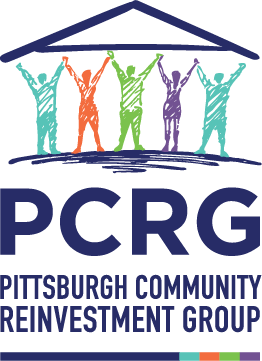OVERVIEW
PCRG and its members have been at the forefront of the land banking movement in Pittsburgh. Following the passage of the statewide legislation in 2012, the City of Pittsburgh, community organizations, community development corporations and land bank advocates worked with the city to bring the land bank to fruition. In 2014, the City of Pittsburgh successfully passed its own land bank ordinance which provided the legal framework for the official creation of the Pittsburgh Land Bank as a separate legal entity from the city.
The mission of the Pittsburgh Land Bank is “to return unproductive real property to beneficial reuse through an equitable, transparent, public process, thereby revitalizing neighborhoods in line with community goals and needs,” as well as to “Support socially and economically diverse communities and strengthen the City’s tax base.”
Now in 2023, nearly a decade since the Pittsburgh Land Bank’s inception, legislative changes have gone into effect to ease and quicken the agency’s ability to get vacant land out of limbo and back to active use have only taken effect over the last few months. They include a recent state law that allows the agency to bypass competitive and lengthy bidding processes and a local measure that gives the land bank transfer and acquisition capabilities –– which already seem effective in breaking the agency’s stagnation.
But officials are still holding back the most critical elements — taxing agreements — necessary for its proper function. Without them, the more than 30,000 vacant and blighted properties scattered across the city will continue to multiply.
For information and questions about the Pittsburgh Land Bank and PCRG's continuing advocacy on its implementation, contact Strategic Engagement Manager Tyler Schaub and Policy Director Chris Rosselot.
PCRG ADVOCACY & RESOURCES
LAND BANK ROAD MAP
It's time to finish what we started. After almost 10 years since its creation, Pittsburgh needs a fully functional land bank with actual property recycling capabilities. Only then can the Pittsburgh Land Bank be a resource to help uplift and protect our communities!
-
In 2014, City Council passed legislation creating the Pittsburgh Land Bank to acquire, manage, and repurpose the city's vacant/abandoned/tax-delinquent properties.
-
With the amended agreement passed (2023), the land bank has now established the processes to transfer and receive properties to/from the city and the Urban Redevelopment Authority (URA).
-
The land bank must negotiate strong cooperation agreements to be able to complete its ability to operate with the City of Pittsburgh, Pittsburgh Public Schools and Allegheny County. PCRG recommends a renegotiation of the existing PWSA agreement to strengthen its cooperation requirements.
-
Currently, the land bank utilizes the Dept. of City Finance to process title clearing. To optimize its property recycling capabilities, the land bank should move this process in-house, as allowed by its creation legislation.
-
The land bank needs updated maps and reports on Pittsburgh's existing vacant properties (both city- and non-city owned). Allowing the land bank to more efficiently identify properties and assess their appropriate land uses.
-
The land bank, with community organizations' input, has already developed the End User Scorecard to ensure the identified land uses are in alignment with the needs of the communities of where the properties are located. This scorecard should be finalized and made public to increase the transparency of the Pittsburgh Land Bank's disposition process.
-
The Pittsburgh Land Bank will now have the necessary agreements to clear title, informed property identification resources, and ample community input for best uses. At this point the land bank can be the resource that the communities of Pittsburgh need it to be.
Letters & Public comment
2023
Taxing body agreements
PCRG and member groups’ letter to the Pittsburgh Land Bank Board and City Council urging for the negotiation of taxing body agreements — a critical step that will allow the land bank to fulfill its promise and actualize its full property-recycling capabilities.
“Tri-Party Agreement” amendments
PCRG and member groups’ letter to City Council calling on officials to amend the local ordinance and establish land transfer and acquisition process between the city, Urban Redevelopment Authority and the Pittsburgh Land Bank. It resulted in the body passing the amended legislation.
Municipal claim and tax lien law amendments
PCRG’s letter to Pennsylvania state legislators supporting the amendment of the Municipal Claim and Tax Lien Law, or MCTLL. The change, which went into effect in early September, now allows the Pittsburgh Land Bank to buy land at sheriff's sale, bypassing the competitive and lengthy treasurer’s sale process, and resulting in a clear title more quickly.
2016
LAND BANK POLICIES AND PROCEDURES
PCRG and member groups’ letter to the Pittsburgh Land Bank Board calling on the agency to create policies and procedures. In 2017 and 2018 City Council passed legislation creating the agency’s bylaws. These changes aimed to enhance transparency, community input, and accountability in PLB operations.
INFORMATIONAL MATERIALS
MEDIA
Unearthing Potential: The Pittsburgh Land Bank’s Journey
A decade since its inception, recent legislation accelerates Pittsburgh Land Bank's impact, but critical challenges remain, impacting the city's blighted properties.
EXTERNAL RESOURCES
CENTER FOR COMMUNITY PROGRESS
Take it to the Bank: How Land Banks Are Strengthening America's Communities
LAND banking FACTS, questions and answers

